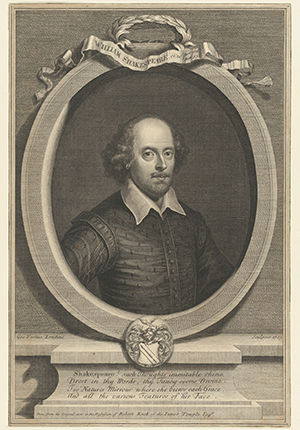Historic Document
Selected Excerpts (1599-1633)
William Shakespeare | 1599-1633

The Metropolitan Museum of Art, New York, Harris Brisbane Dick Fund, 1917.
Summary
William Shakespeare (1564-1616) was a playwright, poet, and author of numerous tragedies, comedies, and histories. Many of the American Founders read and quoted the great Shakespeare. Both John and Abigail Adams dropped phrases from the plays into their letters with an ease that comes from intimate familiarity. And George Washington, Thomas Jefferson, James Madison, John Jay, Benjamin Franklin, and many more of America’s Founding generation minded their Shakespeare. For a people engaged in founding a new order of the ages, who among them was not moved by some of the scenes in Shakespeare demonstrating so vividly and fatally the follies and failures of politics? Having learned from Shakespeare the problem of political legitimacy in the modern world (e.g., after the collapse of belief in the divine right of kings), the American Founders consciously instituted government on a new and they thought, more noble foundation, the idea of human equality and consent of the governed. Following are passages from some of the Shakespearean works especially familiar to the Founding generation.
Selected by

Paul Rahe
Professor of History and Charles O. Lee and Louise K. Lee Chair in the Western Heritage at Hillsdale College

Jeffrey Rosen
President and CEO, National Constitution Center

Colleen A. Sheehan
Professor of Politics at the Arizona State University School of Civic and Economic Thought and Leadership
Document Excerpt
Coriolanus:
Act 4, Scene 1 (quoted by Abigail Adams in a letter referring to the bravery of American soldiers in the Battle of Bunker Hill):
CORIOLANUS:
Come, leave your tears. A brief farewell. The beast
With many heads butts me away. Nay, mother,
Where is your ancient courage? You were used
To say extremities was the trier of spirits;
That common chances common men could bear;
That when the sea was calm, all boats alike
Showed mastership in floating; fortune’s blows
When most struck home, being gentle wounded
craves
A noble cunning. You were used to load me
With precepts that would make invincible
The heart that conned them.
Tempest:
Act 4, Scene 1
These our actors,
As I foretold you, were all spirits and
Are melted into air, into thin air;
And like the baseless fabric of this vision,
The cloud-capped towers, the gorgeous palaces,
The solemn temples, the great globe itself,
Yea, all which it inherit, shall dissolve…
Richard III:
Act V, Scene IV
Rescue, my Lord of Norfolk, rescue, rescue!
The king enacts more wonders than a man,
Daring an opposite to every danger:
His horse is slain, and all on foot he fights,
Seeking for Richmond in the throat of death.
Rescue, fair lord, or else the day is lost!
Alarums. Enter KING RICHARD III
A horse! a horse! my kingdom for a horse!
Withdraw, my lord; I’ll help you to a horse.
Slave, I have set my life upon a cast,
And I will stand the hazard of the die:
I think there be six Richmonds in the field;
Five have I slain to-day instead of him.
A horse! a horse! my kingdom for a horse!
Henry V:
Act IV, Scene III
King Henry V: What’s he that wishes so?
My cousin Westmoreland? No, my fair cousin:
If we are mark’d to die, we are enow
To do our country loss; and if to live,
The fewer men, the greater share of honour.
God’s will! I pray thee, wish not one man more.
By Jove, I am not covetous for gold,
Nor care I who doth feed upon my cost;
It yearns me not if men my garments wear;
Such outward things dwell not in my desires:
But if it be a sin to covet honour,
I am the most offending soul alive.
No, faith, my coz, wish not a man from England:
God’s peace! I would not lose so great an honour
As one man more, methinks, would share from me
For the best hope I have. O, do not wish one more!
Rather proclaim it, Westmoreland, through my host,
That he which hath no stomach to this fight,
Let him depart; his passport shall be made
And crowns for convoy put into his purse:
We would not die in that man’s company
That fears his fellowship to die with us.
This day is called the feast of Crispian:
He that outlives this day, and comes safe home,
Will stand a tip-toe when the day is named,
And rouse him at the name of Crispian.
He that shall live this day, and see old age,
Will yearly on the vigil feast his neighbours,
And say ‘To-morrow is Saint Crispian:’
Then will he strip his sleeve and show his scars.
And say ‘These wounds I had on Crispin’s day.’
Old men forget: yet all shall be forgot,
But he’ll remember with advantages
What feats he did that day: then shall our names.
Familiar in his mouth as household words
Harry the king, Bedford and Exeter,
Warwick and Talbot, Salisbury and Gloucester,
Be in their flowing cups freshly remember’d.
This story shall the good man teach his son;
And Crispin Crispian shall ne’er go by,
From this day to the ending of the world,
But we in it shall be remember’d;
We few, we happy few, we band of brothers;
For he to-day that sheds his blood with me
Shall be my brother; be he ne’er so vile,
This day shall gentle his condition:
And gentlemen in England now a-bed
Shall think themselves accursed they were not here,
And hold their manhoods cheap whiles any speaks
That fought with us upon Saint Crispin’s day.




